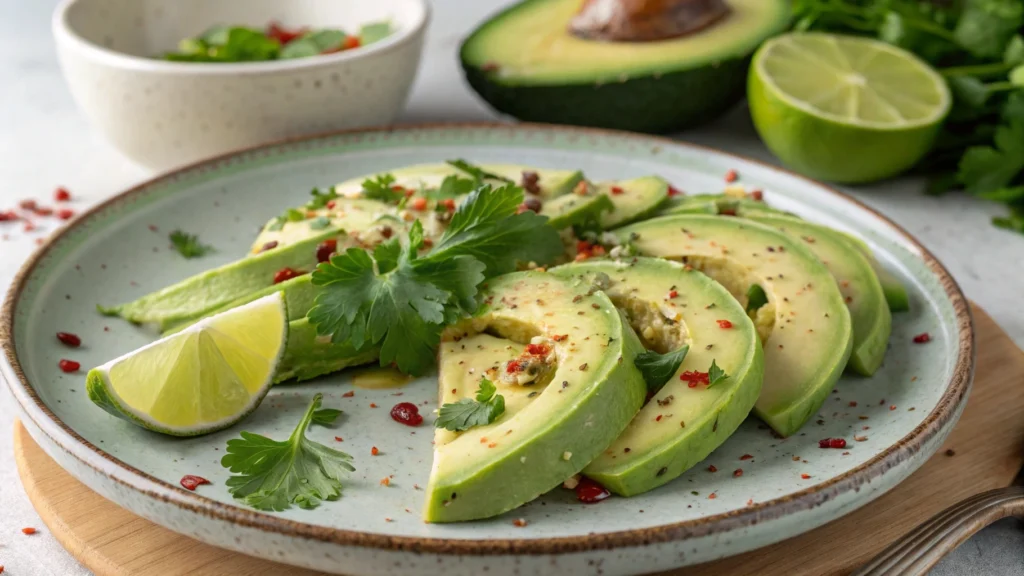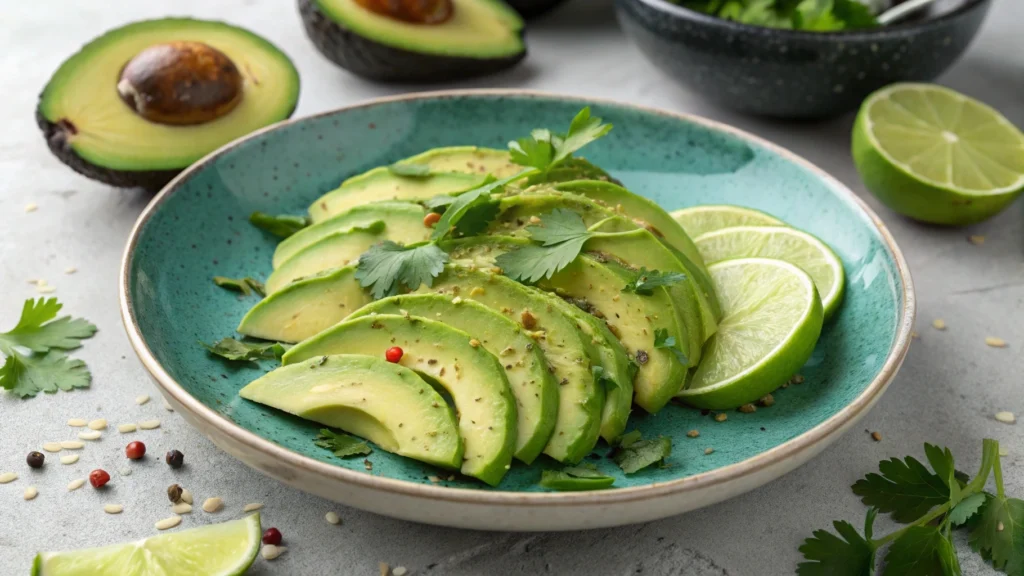Introduction

Avocados are everywhere. From salads to smoothies, this creamy green fruit has taken the culinary world by storm. But beyond its trendy status, do you truly understand the power of avocado? The benefits of avocados are not just about their flavor or smooth texture—they pack a serious punch when it comes to your health. Whether you’re looking to boost your heart health, manage your weight, or maintain glowing skin, this fruit has something special for everyone.
In this article, you’ll discover 7 amazing health benefits of avocado that you might not know. These benefits go beyond what you may have heard about avocado being a superfood—it’s time to unlock the full potential of this nutrient-packed fruit. Let’s dive in!
Avocados Are Packed with Nutrients: Nutritional value of avocado
Nutritional Value of Avocado: Nutritional value of avocado
- Avocados are a nutrient-dense superfood that provides a wide array of vitamins, minerals, and healthy fats. Packed with essential nutrients, they make an excellent addition to any balanced diet.
- Fiber: Avocados are rich in dietary fiber, which is essential for digestion, gut health, and maintaining healthy blood sugar levels.
- Vitamins and Minerals: In every serving, you’ll find an abundance of vitamins and minerals, including vitamin K, vitamin C, vitamin E, and B-vitamins, alongside vital minerals like potassium.
- Healthy Fats: A key feature of avocados is their high content of monounsaturated fats—specifically oleic acid, which supports heart health and reduces inflammation.
Key Vitamins and Minerals
- Vitamin E: This potent antioxidant supports skin health, boosts the immune system, and combats free radical damage.
- Potassium: A mineral essential for regulating blood pressure, supporting nerve function, and balancing fluids in the body.
- Folate: Crucial for cell repair and growth, folate helps maintain healthy DNA, and it is especially important for pregnant women.
Healthy Fats and Their Benefits
- Monounsaturated Fats: Avocados are a rich source of oleic acid, a heart-healthy fat that has been shown to lower bad cholesterol levels (LDL) and boost good cholesterol (HDL).

Avocado Can Improve Heart Health: Avocado for heart health
Monounsaturated Fats and Cholesterol
- Avocados are a heart-healthy food due to their high content of monounsaturated fats, which have been proven to improve cholesterol levels. These fats help to lower LDL (bad cholesterol) while increasing HDL (good cholesterol).
- Eating avocados regularly can support a balanced lipid profile, which plays a crucial role in preventing heart disease.
Heart-Healthy Nutrients
- Lutein and Zeaxanthin: These powerful antioxidants found in avocados help to protect against cardiovascular diseases by reducing inflammation and oxidative stress in the heart.
Research on Avocado and Cardiovascular Health
- Numerous studies support the positive effects of avocados on heart health. Research has shown that individuals who consume avocados have a lower risk of heart disease, owing to their favorable impact on cholesterol and overall cardiovascular function.
Supports Weight Loss and Metabolism: Avocado for heart health
Avocado and Weight Loss
- Avocados are an excellent food choice for those looking to manage their weight. Their high fiber content keeps you feeling full and satisfied, reducing the likelihood of overeating or snacking throughout the day.
- Despite their creamy texture, avocados are relatively low in net carbs, making them ideal for those following low-carb or keto diets.
Healthy Fats for a Healthy Metabolism
- Monounsaturated fats in avocados not only improve heart health but also support a healthy metabolic rate, ensuring that your body burns fat more efficiently.
- Additionally, the healthy fats help stabilize blood sugar levels, which can further aid in weight management.
Portion Control
- While avocados are packed with healthy fats, it’s important to practice portion control. A small serving—typically one-quarter to one-half of an avocado—is enough to reap the benefits without overdoing the calories.

Boosts Skin and Hair Health
Avocado for Glowing Skin
- Vitamin E, vitamin C, and healthy fats make avocados an ideal food for promoting radiant skin. These nutrients fight free radicals, reduce signs of aging, and support skin hydration.
- Eating avocado regularly can help you maintain soft, supple skin and combat dry patches, blemishes, and fine lines.
Avocados for Hair Health
- The healthy fats in avocados can also work wonders for your hair. Oleic acid helps to keep hair moisturized, prevents damage, and promotes hair growth by nourishing the scalp.
- Avocado’s vitamin E content supports healthy hair follicles, making it an excellent addition to any hair-care routine.
Topical Uses of Avocado
- You can apply avocado directly to your skin or hair for a natural, nourishing DIY treatment. Use mashed avocado in a homemade face mask or as a deep conditioner for your hair. The results are softer, more hydrated skin and shinier hair.
Supports Eye Health and Vision
Lutein and Zeaxanthin
- Lutein and zeaxanthin are two powerful antioxidants found in avocados that play a vital role in protecting eye health. These compounds help filter harmful light and protect the retina from oxidative damage.
- Regular consumption of avocado has been linked to a reduced risk of eye diseases like macular degeneration and cataracts.
Avocados for Better Vision
- Including avocado in your diet may help improve overall vision. These antioxidants help to maintain the health of your eyes, ensuring that they are better protected against aging and damage from environmental factors like UV rays.
How to Incorporate Avocado into Your Diet for Eye Health
- Add avocado to your meals in creative ways—throw it in salads, sandwiches, or smoothies. Try adding a scoop of mashed avocado to your morning toast for an extra boost of eye-protecting nutrients.

Conclusion: Avocado health benefits
Avocados are more than just a delicious addition to your meals—they are packed with health benefits that can transform your well-being. From improving heart health to boosting your metabolism, glowing skin, and better vision, this superfood offers endless benefits. By adding avocado to your diet, you can enjoy these health benefits and enhance your overall wellness.
It’s time to embrace the power of avocado! Add this creamy fruit to your meals and reap the rewards for your health. Start today by including avocado in your breakfast, lunch, or dinner, and experience the transformation for yourself!
FAQ: Frequently Asked Questions
Q1: What are the health benefits of avocado?
Avocados are packed with nutrients such as healthy fats, fiber, potassium, and vitamins that support heart health, weight loss, skin health, and more. They are a great addition to a balanced diet for overall wellness.
Q2: How does avocado help with weight loss?
Avocados are rich in fiber and healthy fats, which promote feelings of fullness and reduce overeating. These nutrients support a healthy metabolism, making avocados a great food choice for weight management.
Q3: Can avocado improve my skin and hair?
Yes! The vitamins, antioxidants, and healthy fats in avocado help maintain healthy, radiant skin and prevent hair damage. Avocados nourish the skin and scalp, leaving you with glowing skin and shiny hair.
Q4: How does avocado benefit heart health?
Avocados contain monounsaturated fats, such as oleic acid, which improve cholesterol levels by increasing good cholesterol (HDL) and reducing bad cholesterol (LDL). They also contain lutein and zeaxanthin, antioxidants that help protect the heart from oxidative stress and inflammation.
